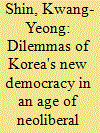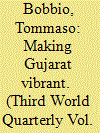| Srl | Item |
| 1 |
ID:
112495


|
|
|
|
|
| Publication |
2012.
|
| Summary/Abstract |
This paper explores how the return to power by the authoritarian conservative Grand National Party after a decade of liberal government was possible, drawing attention to the mode of democratic transition and its impact on democratic consolidation, and to the role of civil society in South Korea. It examines how the democratic transition by pact failed to eliminate the legacies of authoritarianism within the state and civil society and contributed to the maintenance of authoritarian civic organisations established by the military regime. Whilst liberal democratic parties took power in the midst of the East Asian financial crisis, they ultimately undermined their own social bases by carrying out neoliberal economic reforms in order to tackle the crisis. The rise of conservative civil society in the 2000s formed the social base upon which the Grand National Party was able to regain state power through a significant shift in voters' party preference. Its reorganisation of the conservative civic organisations played a key role in mobilising frustrated voters to support it in 2007. The Korean experience of democratisation demonstrates that democratic transition is not only a political process but also a social and economic process, revealing that in Korea civil society has been far from democratic.
|
|
|
|
|
|
|
|
|
|
|
|
|
|
|
|
| 2 |
ID:
113097


|
|
|
|
|
| Publication |
2012.
|
| Summary/Abstract |
A significant aspect of India's postcolonial history has been the rise of subnationalism-popularly addressed as the challenge of regionalism-which has often pitted the Indian state against the regional centres of power. In fact, the organisation of Indian territory along linguistic lines favoured the emergence of regional movements challenging the authority of the central government in arguments typical of nationalist rhetoric, such as the specificity of language, territory and traditions. This notion of subnation, however, has taken a new turn during the past two decades of neoliberal reforms as regional states compete with each other to attract greater foreign and domestic investment and to secure higher growth rates. Taking as a point of departure the case of 'Vibrant Gujarat', this article proposes rethinking the emergence of subnational cultures in the past two decades in the light of the effects of the neoliberal economic reforms and the rise of Hindu extremist movements in the political arena.
|
|
|
|
|
|
|
|
|
|
|
|
|
|
|
|